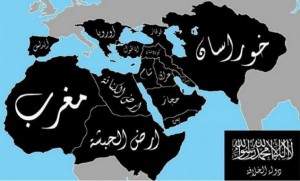Would the defeated ISIS members in Syria and Iraq move the flags of the so-called Caliphate to new lands in other countries, knowing that their organization will never waive its dream despite its successive losses against the International Coalition led by the United States?
Responding to this question, Egyptian experts have expected that Yemen, Tunisia, Jordan, Morocco, Algeria, Malaysia, South Philippine, Indonesia, Canada, Italy, United States, Belgium, and France will be the next destinations for ISIS.
In a study prepared by Dar Al-Ifta, Cairo, those experts asserted that the organization will use all means for undercover work – like opting for fake visas to ease their entrance in these countries. They told Asharq Al-Awsat that ISIS will not only seek to infiltrate Arab countries, but also Western states and will exploit the idea of “International Caliphate” to attract western members who believe in its ideology to join it voluntarily, or through its usual attraction means to polarize youth.
The study has called on the neighboring countries of Iraq, Syria, and Libya to be aware from ISIS members who could escape to their lands running from operations targeting them.
Spite and Exhaustion
The study showed that ISIS’ declared strategies point to its continuous efforts to find crowded regions to announce their so-called Caliphate; once weakened, it moves to the easiest strategy of spite and exhaustion to face armies and local authorities.
The terrorist organization considers this strategy a vital fuel that fulfills its role in igniting conflicts and clashes. A source from Dar Al-Ifta said that the aforementioned strategy requires a big number of militants who fight with ISIS and work on expanding the regions of turmoil through quick proliferation and continuous displacement among different regions. He added that ISIS’ adoption of this strategy aims at distracting efforts to eradicate it by expanding the conflict’s arena and turning the international concentration to different regions in the world.
The study continues that “spite and exhaustion” causes major losses in countries amid the difficulty in determining identities of extremist members and the places they intend to target, which contribute in carrying out many terrorist operations to disturb countries and hit their stability, threaten their economic resources, and drive out tourism and foreign investments.
The source expected ISIS to spread like cancerous cells worldwide, exposing international security to major threats.
Field Setbacks
According to the same study, many indications and developments in the field show that ISIS has lost many strongholds in Syria, Iraq, and Libya mainly after the Mosul operation along with the strikes on Raqqa and Sirte; these losses will certainly push the organization’s members to escape and launch attacks with fewer costs.
Europe, United States, and Yemen
Dr. Hamed Meccawi assured that ISIS will seek to export terrorism from the Middle East to the European countries and the United States through thousands of recruited trained youth. Meccawi expected Yemen to be the main destination of the organization, followed by Tunisia, Jordan, Morocco, Algeria, Malaysia, and the south of Philippine where Muslims suffer from oppression and will probably be considered incubators for terrorism growth.
On how to confront ISIS to prevent its spread in neighboring countries of Syria, Iraq, and Libya, Dr. Mahmoud al-Sawi, professor from Cairo said that dismantling the terrorist hate speech is a must; he considered that all the concerned parties and institutions should join hands to raise awareness among our communities and spread the correct concepts of Islam.
International Coalition
The study has stressed the importance of forming an international coalition to confront this dangerous threat and to besiege it. It also pointed that countries should change their combat strategies.
The “Caliphate” term
Sawi considered that ISIS had been the worst promoter of Islam and Caliphate because it intended to misuse this term and exploit it to justify bloody acts.
On another hand, observers see that the continuous withdrawal of ISIS from Syria and Iraq will definitely increase splits within its ranks, which might weaken the organization’s capacity in carrying out terrorist operations in the coming stage.
aawsat.com



